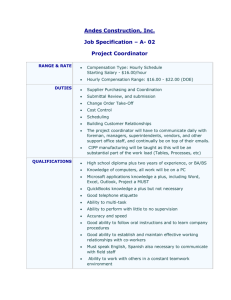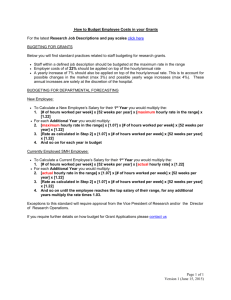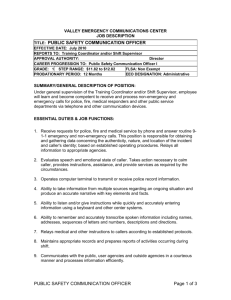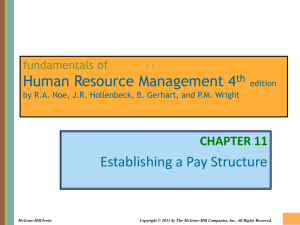Construction Manager
advertisement
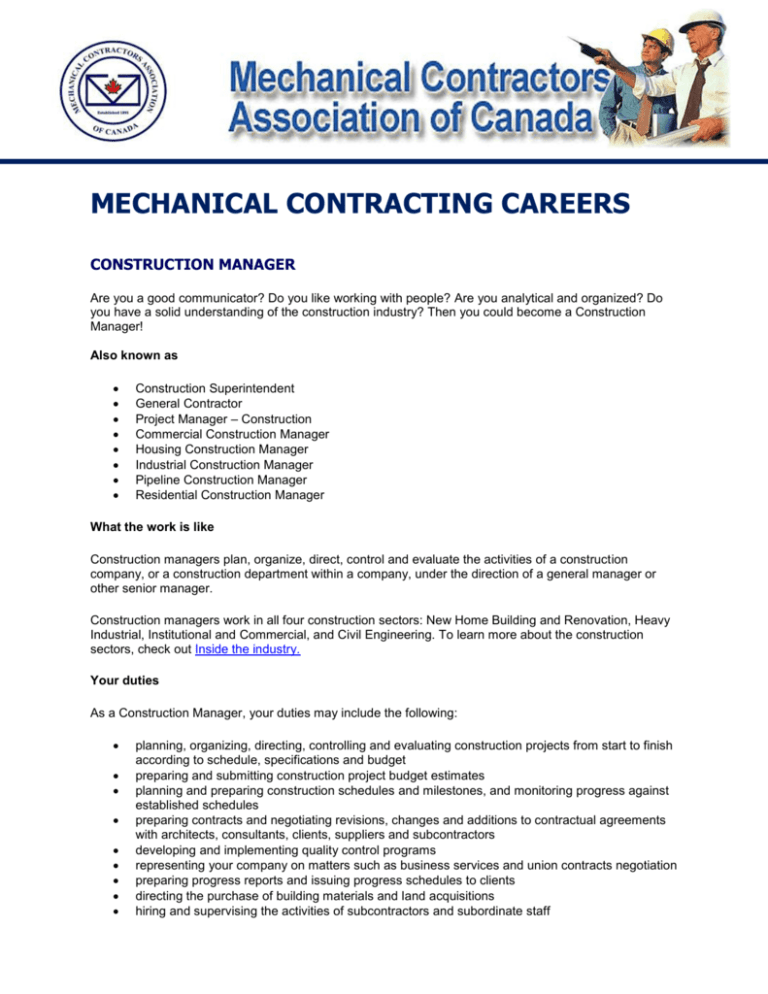
MECHANICAL CONTRACTING CAREERS CONSTRUCTION MANAGER Are you a good communicator? Do you like working with people? Are you analytical and organized? Do you have a solid understanding of the construction industry? Then you could become a Construction Manager! Also known as Construction Superintendent General Contractor Project Manager – Construction Commercial Construction Manager Housing Construction Manager Industrial Construction Manager Pipeline Construction Manager Residential Construction Manager What the work is like Construction managers plan, organize, direct, control and evaluate the activities of a construction company, or a construction department within a company, under the direction of a general manager or other senior manager. Construction managers work in all four construction sectors: New Home Building and Renovation, Heavy Industrial, Institutional and Commercial, and Civil Engineering. To learn more about the construction sectors, check out Inside the industry. Your duties As a Construction Manager, your duties may include the following: planning, organizing, directing, controlling and evaluating construction projects from start to finish according to schedule, specifications and budget preparing and submitting construction project budget estimates planning and preparing construction schedules and milestones, and monitoring progress against established schedules preparing contracts and negotiating revisions, changes and additions to contractual agreements with architects, consultants, clients, suppliers and subcontractors developing and implementing quality control programs representing your company on matters such as business services and union contracts negotiation preparing progress reports and issuing progress schedules to clients directing the purchase of building materials and land acquisitions hiring and supervising the activities of subcontractors and subordinate staff Work conditions Construction managers generally work more than a standard 40-hour workweek, depending on the job schedule and any delays that may arise. They are often on call 24/7 to deal with problems and emergencies. As a Construction Manager, you may work out of a main office or a field office on the job site. As with all careers in the construction industry, safety is the top priority. Construction managers are trained to work safely, and wear special equipment such as hard hats, gloves and steel-toed boots whenever they are on construction sites. Essential Skills Human Resources and Skills Development Canada (HRSDC) has identified nine Essential Skills that are necessary to succeed in the workplace. These skills provide the foundation for learning all other skills and apply to most construction careers. Best of all, you can learn and improve on these skills in school, on the job and during your everyday life. Some important Essential Skills for construction managers are the following: Thinking Skills – finding and evaluating information to make decisions, solve problems, and plan and organize job tasks Oral Communication – conveying or exchanging information verbally Reading Text – reading various types of documents of varying complexity Document Use – reading and interpreting documents to extract information Click here to learn more about Essential Skills. Certification Certification is available through the Canadian Construction Association’s Gold Seal Certification Program, a national program for construction project managers, superintendents and estimators. Certification tells employers and other workers that you are a skilled professional. It also helps you get jobs. Certification is based on your education, experience and ability to satisfy the program requirements. You may also be required to take a Gold Seal exam. With a Gold Seal, you can work as a Construction Manager anywhere in Canada. For more information on Gold Seal Certification, click here. Where to study in Canada To become a Construction Manager, you can enroll in civil engineering or construction technology at most Canadian universities or colleges. Several years of experience in the construction industry, including experience as a construction supervisor or field superintendent, is usually also required. The Canadian schools listed below offer programs specific to construction management. In addition, some local construction organizations may offer courses in project management. To find out who to contact, check out Related links. Alberta Southern Alberta Institute of Technology University of Calgary New Brunswick Construction Technology Centre Atlantic New Brunswick Community College University of New Brunswick British Columbia British Columbia Institute of Technology Ontario Algonquin College George Brown College Humber School of Applied Technology Ryerson University Speciality programs Concordia University offers a graduate program for practicing engineers who want to specialize in construction management. George Brown College offers a one-year graduate diploma program for internationally educated professionals. Salary ranges Construction Manager hourly wages vary depending on the contract, the company, and local and national economic conditions. Typical hourly wage ranges for construction managers (based on national or regional averages) are as follows: Inexperienced and or newly appointed construction managers Region Typical hourly rate National average Atlantic Canada Ontario and Quebec Western Canada $16-$19 $13-$17 $16-$17 $17-$20 Based on national averages, inexperienced workers can earn annual salaries ranging from $33,000 to $40,000 per year, not including overtime. Experienced construction managers Region Typical hourly rate National average Atlantic Canada Ontario and Quebec Western Canada $26-$30 $22-$26 $26-$28 $28-$32 Based on national averages, experienced workers can earn annual salaries ranging from $54,000 to $62,000 per year, not including overtime. Highly experienced construction managers Region Typical hourly rate National average Atlantic Canada Ontario and Quebec Western Canada $35-$45 $30-$40 $38-$43 $39-$50 Based on national averages, highly experienced workers can earn annual salaries ranging from $73,000 to $94,000 per year, not including overtime. Construction work can involve overtime, so your total annual salary will vary depending on the number of overtime hours you work. In addition to the hourly rate, many construction workers receive statutory holiday and vacation pay. Depending on the contract, you may also receive benefits such as group insurance for health, dental, and vision care, as well as retirement packages and training benefits up to 30% of your hourly rate. If you are self-employed, it is up to you to arrange your own benefits. Building your career With experience, you could move into more senior management positions. As with most construction careers, your skills are portable. If you want to move, you can take your skills with you.

